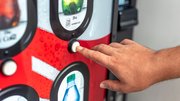Vending
Surviving pandemic: What to add, what to keep and what to ditch
A pair of far sighted convenience services operators who see beyond the present explain how they are using the downtime to be ready when prosperity returns.

October 12, 2020 by Elliot Maras — Editor, Kiosk Marketplace & Vending Times
The business slowdown has forced convenience services operators to make a lot of tough decisions, such as cutting staff and curtailing services. But far sighted operators who see beyond the present are using the downtime to be ready when prosperity returns.
A pair of veteran convenience services operators — Dennis Thornton, CEO, Vendedge, Roswell, Georgia, and Patrick Moran, owner, Moran Refreshments, Tyler, Texas — sounded upbeat as they shared their ideas on coping with COVID-19 during a National Automatic Merchandising Association webinar last week.
 |
The webinar, titled, "What to add, what to keep and what to ditch," was sponsored by Crane Payment Innovations and moderated by Ben White, NAMA director of education and training.
Moran and Thornton are using the downtime to get to know their customers better, scrutinize their assets and adjust their service offerings to improve their profitability. Both think they'll be operating more efficiently and effectively as business continues to recover.
Don't panic
At the start of the webinar, they warned listeners not to panic when faced with the need to make the difficult decisions they agreed need to be made.
"We do not let panic or fear determine our actions," Moran said. "It would be easy to make decisions out of fear of the unknown, and certainly this is an unknown situation."
For example, while it might be necessary to reduce staff, Moran and Thornton pointed out that sufficient manpower will be critical when business recovers and good employees will be hard to find.
Moran said he is currently overstaffed given the amount of work he has, but he does not see this as a problem given the recovery he envisions.
"It's very expensive to have to start again, retrain, restart, and if we can avoid that, that's certainly a positive," Thornton said in agreement with Moran. He suggested reducing hours and have employees work on alternate weeks as a way to avoid laying people off.
Safety protocols add value
The veterans also agreed they will be keeping some of the safety protocols they have enacted as a result of the pandemic. The requirements they are now following for entering their operating facilities will continue to maintain employee and customer safety.
Thornton said visitors to his facility are expected to make appointments as opposed to showing up unannounced. "We don't want a waiting room full of people at the same time," he said. In addition, everyone has their temperature taken with a forehead thermometer.
Moran said there is one point of entry to his facility and people are not permitted in the surrounding areas. The door is kept open during working hours so no one has to touch it. Visitors have their temperatures taken and are instructed to wash their hands.
Logs are kept of people entering along with their temperatures, he said, which gives clients confidence that the company is looking out for them.
"Post COVID this is going to continue," Moran said.
He does not expect face masks to be mandatory post COVID, but if someone has a symptom, they will be instructed to wear a mask.
Improve profitability
Moran and Thornton also agreed that the pandemic has made it easier to adjust services to maintain account profitability. It is important to meet with customers and explain the need to make changes, they said, but the pandemic has made it easier for customers to accept change.
"Let's fix things now because the client is more amenable to the changes because they know what's going on," Thornton said. The clients know because their own supply chains have been interrupted.
As a result of some of these changes, Thornton said some manual cafeterias have been converted to micro markets, some micro markets have been converted to vending banks, and some locations that were marginal pre-pandemic have been discontinued.
Moran said there has been no negative response from customers where changes were made.
They are also meeting with accounts that are operating at reduced capacity to get an idea when they expect business to improve.
"We're trying to find out as much about their business as we possibly can," Thornton said.
Thornton has reduced his SKUs, some of which has been forced by suppliers focusing on core items. A lot of can beverages and plastic bottles have gone away. While reducing SKUs can simplify operations and improve profitability, he said it is always necessary to explain changes to customers.
The pandemic has also made more customers aware of existing contactless payment capabilities.
Many clients were not previously aware they could make mobile payments at vending machines, Moran said.
Having an app based purchase for micro markets been especially popular with customers, Moran said. "They can still check out at a kiosk at a location, but they can also check out on a mobile device," he said.
The white board matters
Moran and Thornton also agreed on the importance of having a white board to keep the team up to date on everything they're hearing from customers and suppliers.
"The white board is essential," Moran said. "We use that white board to keep it all in one place. Every day, the information is changing. Badges (which customers use to allow visitors to enter their premises) have been turned off. They (customers) want to know when we're coming, what we're doing."
They are also getting information from non-traditional contacts. "The route man may be hearing from maintenance people at the facility," Thornton said, concerning customer access restrictions.
"We're having to change our route service times because we can't get in when we used to be able to get in," Thornton said. "They (clients) want to know when you're there and make accommodations for that."
Improve operations
Moran has also used the downtime to scrutinize his operations, specifically his warehouse procedures. The company had never fully implemented pre-kitting its deliveries companywide.
"When we come out of COVID, we are going to be positioned to be super efficient," he said.
Leverage existing resources
Thornton has been able to allocate some of his resources to his sister companies, which include a landscape management service and an e-commerce business known as Supply Wizard for office, hotel and pantry supplies. Many customers are switching to e-commerce purchases to reduce personal interactions.
Thornton uses his Lightspeed Automation warehouse automation to pick and load e-commerce orders and his route vehicles to deliver the orders.
"We're looking to add more business to our company through these alternative means," Thornton said.
And as business owners look forward to a more active business climate, reduced street traffic caused by the pandemic have brought a benefit.
"Our drivers are able to go faster and get to locations quicker because there is less traffic," Thornton said.
The veterans also agreed that the personal protective equipment demand has declined since the start of the pandemic and is not going to continue once the pandemic passes.
Fort an update on how the coronavirus pandemic is affecting convenience services, click here.
About Elliot Maras
Elliot Maras is the editor of Kiosk Marketplace and Vending Times. He brings three decades covering unattended retail and commercial foodservice.
 ChatGPT
ChatGPT Grok
Grok Perplexity
Perplexity Claude
Claude






